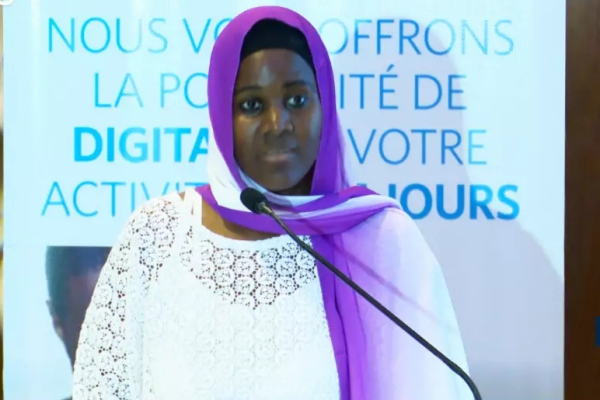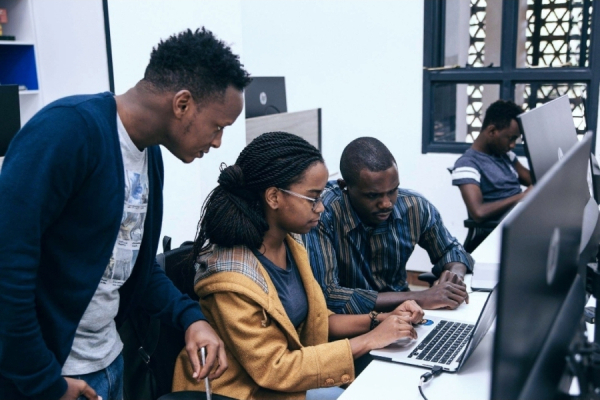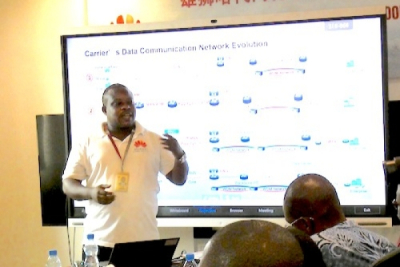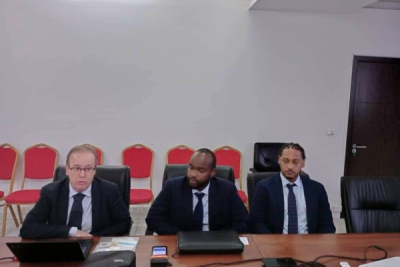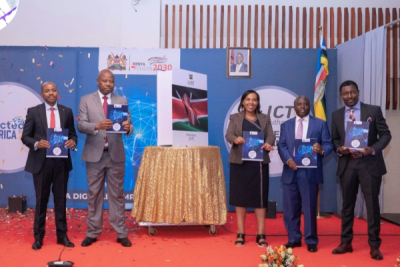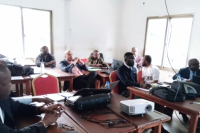
Public Management (481)
Senegal's government launched the third annual Digital Back-to-School event on Thursday, September 19. The theme for this year's event was 'The Future of Artificial Intelligence and Employment Challenges.
Senegal is undergoing a significant shift towards artificial intelligence (AI), according to the government, which is calling for a complete overhaul of the national education system to keep pace with the technological advancements.
Bitilokho Ndiaye, Director of Digital Economy Promotion and Partnerships, made the announcement on Thursday at the 3rd edition of the "Digital Back-to-School" event.
"Our country has already turned towards AI, but it's crucial to accelerate this transition," Ndiaye said. "Ensuring no one is left behind means revamping our education system."
AI has become a driving force in digital transformation worldwide. While Africa currently accounts for only 2.5% of the global AI market, according to the GSMA, emerging applications could boost the continent's economy by up to $2.9 trillion by 2030.
"We cannot afford to miss this revolution. AI offers immense opportunities to enhance productivity, innovate in public services, and address local challenges like providing universal access to quality healthcare," Ndiaye added.
Adoni Conrad Quenum
Digital transformation, a key focus of the United Nations for the past three decades, emphasizes the modernization of public services as a crucial driver of development. While Africa has historically trailed behind other regions in this area, the gap is rapidly closing.
Gabon, South Africa, Tunisia, Mauritius, and Ghana remain leaders in the implementation of e-government within their respective regions, according to the "E-Government Survey 2024: Accelerating Digital Transformation for Sustainable Development" report by the United Nations Department of Economic and Social Affairs (UN DESA). These countries were already the leaders in the 2022 survey.
South Africa continues to lead both in Southern Africa and across the continent, boasting a very high development index. Mauritius remains the frontrunner in East Africa, while Tunisia retains its top spot in North Africa, climbing one position in the continental rankings to third, after being fourth in 2022. Ghana, the leader in West Africa, ranks seventh continentally, while Gabon leads in Central Africa, though it has dropped to fifteenth overall, down from eleventh in 2022.
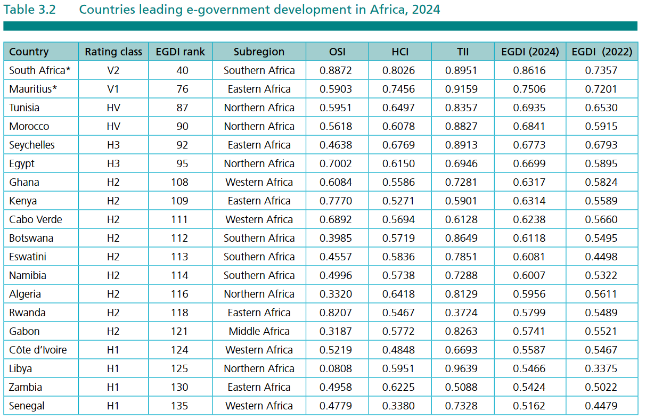
These five nations stand out due to their e-government development index (EGDI) scores, which exceed the African average of 0.4247 (on a scale of 1.0000). Their strengths lie in telecommunications infrastructure, human capital development, and online services, approaching the global average of 0.6382.
As regional leaders in e-governance, these countries set an example for others across Africa. Their advancements highlight the importance of investing in digital infrastructure, human capital, and enhancing online services. If this momentum spreads across the continent, it could significantly accelerate Africa's digital transformation, foster economic growth, and support sustainable development.
Samira Njoya
As digital transformation rapidly takes hold in Africa, digital skills have become indispensable. To facilitate this shift, numerous organizations, businesses, and institutions are launching initiatives and programs aimed at bolstering digital literacy.
Chinese tech firm Huawei launched, last Monday, a two-week training program for teachers at the National Institute of Post, Information Technology, and Communication (INPTIC). The program aims to equip educators with essential digital skills and prepare them to obtain certification upon completion.
"By the end of this training, these teachers will be equipped with the necessary skills to pass on to their students," said Lee Nesta Veronne Komault, head of human resources at Huawei Gabon.
The initiative is part of Huawei's ICT Academy program, a school-business cooperation project designed to provide students with access to the latest technologies and ICT knowledge.
According to the "Skills for Employability and Productivity in Africa (SEPA) Action Plan, 2022–2025," published by the African Development Bank, Africa is expected to create 230 million digital jobs by 2030.
In addition to INPTIC, the training program will be conducted in other institutions across Gabon. Huawei aims to accelerate scientific and technological innovation on the continent by investing in knowledge development and talent cultivation. "By strengthening cooperation between schools and businesses, Huawei aims to align academic programs with industry sectors, course content with professional qualifications, teaching structures with production processes, and talent development with employment," the company explained.
Adoni Conrad Quenum
The Tunisian government's national policy prioritizes the digitization of services. In 2022, the administration had already digitized the birth certificate process.
Tunisia is seeking a company to build an electronic visa platform. Last week, the Ministry of Communication Technologies launched an international tender for the project, with submissions open until October 15.
The e-visa platform is expected to be developed within 12 months. To fund the project, the Tunisian government will use part of a loan from the African Development Bank (AfDB), granted under the "Tunisia Digital 2020" national strategic support project (PNS TD2020).
This initiative aligns with the goals of the "Tunisia Digital 2025" strategic plan, which emphasizes the digitization of public services. Other planned projects include the establishment of a national address directory, the implementation of e-justice, the creation of a private cloud for the Ministry of the Interior, infrastructure for e-government, the development of an internal HR management system for public administration, and a platform for monitoring cyber threats.
With the e-visa platform, the Tunisian government hopes to streamline the visa application process and reduce processing times. It also expects this initiative will boost economic cooperation and open new tourism markets.
According to official statistics, Tunisia welcomed 9.37 million tourists in 2023, a 45.5% increase from 2022. In its Spring 2024 "Economic Outlook Bulletin," the World Bank reported that tourism revenues rose by 28.1% in 2023, reaching 6.9 billion Tunisian dinars ($2.27 billion). This accounted for 4.4% of GDP, up from 3.8% in 2022.
Isaac K. Kassouwi
Last June, Gabonese authorities approved a €56.2 million loan for invesments in digital infrastructure. Since then, the government has launched various projects and forged strategic partnerships to accelerate the country's digital transformation.
On Friday, September 13, in Libreville, Gabon's Minister of Digital Economy and New Information Technologies, Bonjean Rodrigue Mbanza, welcomed representatives from Swiss Authentis, a Swiss tech firm. The meeting aimed to explore the company's offerings to facilitate the digitization of Gabon's public services.
"I have asked my team to carefully review the various solutions proposed to assess their suitability for our needs. Gabon remains fully open to all innovative technological proposals and is committed to its strategy of becoming a tech hub in Central Africa," the minister stated.
This initiative follows the Council of Ministers' recent approval of a bill allowing Gabon to secure a €56.2 million loan from the International Bank for Reconstruction and Development (IBRD), part of the World Bank Group. The loan is part of the "Digital Gabon" project, which seeks to modernize public administration through digital transformation.
Moreover, Gabon is considered a leader in Central Africa when it comes to information and communication technologies. According to the International Telecommunication Union, the country achieved an ICT development index score of 74.7 out of 100 in 2024, ranking 10th on the continent. Libya (88.1), Morocco (86.8), and Seychelles (84.7) top the list.
The Kenyan government plans to place digital technology at the core of the country's socioeconomic development. To realize this ambition, investments in infrastructure, among other areas, will be essential.
Kenya’s ICT Authority (ICTA) has outlined a need for 304.37 billion Kenyan shillings ($2.35 billion) to implement its 2024-2027 strategic plan. Officially launched on Friday, September 13, the roadmap includes programs and initiatives aimed at advancing the country's digital transformation.
The plan calls for 235 billion shillings over five years to ensure universal, secure, and reliable internet access. Another 9.5 billion will be allocated to expanding access to digital products, while 32.5 billion will be invested in fostering sustainable digital culture. Additionally, 23.8 billion shillings are earmarked for creating an optimized and unified digital environment, and 3.7 billion will go toward strengthening organizational capacity and improving operational efficiency.
“This plan lays the groundwork for transformational projects such as nationwide digital literacy programs, the expansion of secure broadband infrastructure, and the implementation of e-government services that bring public services to the fingertips of every citizen,” said Margaret Ndung'u, Kenya’s Minister of Information, Communication, and Digital Economy.
These initiatives align with the broader Kenya Digital Master Plan, which envisions investments totaling 484.241 billion shillings from 2022 to 2032 to support the government's ambition of leveraging digital technology for socioeconomic development.
Kenya’s digital push has gained momentum with international partnerships. The country recently joined the Asian Infrastructure Investment Bank (AIIB) and secured $238 million from Korea Eximbank to invest in the smart city project, Konza Technopolis. In April 2023, the World Bank provided $390 million to accelerate Kenya's digital economy, and the country is seeking further support from nations like China, Indonesia, India, and Malaysia.
Isaac K. Kassouwi
To advance the digitization of its public services, the Congolese government has partnered with the World Bank and a specialized consulting firm.
A working meeting was held on Friday, September 13, to outline a roadmap for digitizing Congolese public services. The gathering brought together stakeholders from government ministries, supervisory administrations, and the consulting firm developing the digital platform, ADDINN.
According to Francis Seck Mangouani, national coordinator of the Digital Transformation Acceleration Project (PATN), the beta version of the portal interface is expected to be ready within four months. "This workshop focused on implementing the government's public services portal. We discussed how to prioritize certain services and reviewed the six priority sectors outlined in the 2022-2026 National Development Plan," said Guy Parfait Sosthène Itoumou, head of research and planning at the Agency for Digital Economy Development.
This initiative follows the World Bank's recent mission supporting the implementation of the PATN. The institution is financing the project with $100 million as part of the "Congo Digital 2025" strategy. One of its main objectives is to modernize the practices and services of public administration, with e-government and e-citizen initiatives emerging as key pillars of this strategic vision.
The creation of a national public services portal will facilitate access to administrative procedures, particularly for people in remote areas, allowing for real-time tracking of processes, which will improve transparency and trust in public services. For the administration, it will help reduce costs related to document management and in-person interactions with the public.
Adoni Conrad Quenum
Congo is digitizing government administration. Authorities have confirmed a project to digitize documents from two ministries and their affiliated agencies.
Séraphin Ondélé, Chief of Staff at the Ministry of Interior, Decentralization, and Local Development, met with Jean Luc Magré, Africa Manager for FamilySearch, on September 11. The meeting focused on advancing the civil status archives digitization project.
The initiative aims to digitize civil status documents generated by town halls and other decentralized administrations, as well as culturally significant archives, involving both the Ministries of Interior and Culture.
“The project emphasizes the digitization of civil status archives in collaboration with the Ministry of Interior. These documents will assist researchers in their studies and help families trace their ancestry and understand their cultural heritage. Today's meeting provided clarity on the project's parameters and helped establish a collaborative framework for moving forward,” Magré stated.
This project is part of the National Digital Economy Development Strategy, dubbed “Congo Digital 2025.” Its objectives include leveraging digital technology to enhance business competitiveness, attract foreign direct investment, and diversify the economy. According to the United Nations E-Government Development Index, the country scored 0.3675 in 2022, ranking 161st out of 193 nations.
Adoni Conrad Quenum
The Togolese government is focusing on high-speed internet, e-government services, and data security. To make this happen, it's teaming up with experienced international partners.
On September 4, in Beijing, Togo’s authorities signed a memorandum of understanding with Chinese tech giant Huawei. The goal of this partnership is to strengthen the country's digital infrastructure.
This deal was signed during the 9th edition of the Forum on China-Africa Cooperation. Togo’s leaders met with several Chinese companies to secure strategic contracts, with a focus on advancing their digital transformation.
This move aligns with the "Togo Digital 2025" strategy, launched in June 2022, which is aimed at promoting social inclusion and economic growth through digital advancements. Key initiatives include building a digital innovation ecosystem, providing widespread access to high-speed internet and technology, and digitizing key sectors of the economy.
In addition to Huawei, Togo has partnered with other tech companies, such as French firms Atos and Idemia, to develop a national electronic identification system. Earlier this year, the country also turned to Kazakhstan’s National Information Technologies to support digital projects and improve the digitalization of government services.
To support digital transformation, the authorities have launched the "Congo Digital 2025" strategy. This plan includes various programs and projects backed by multiple technical and financial partners.
Congo’s Minister of Posts and Telecommunications Léon Juste Ibombo, on Wednesday, unveiled several initiatives during a ceremony where computer equipment was donated to Marien Ngouabi University.
“A few months ago, we initiated the connectivity of the two major universities in our country, Marien Ngouabi University and Denis Sassou Nguesso University. The work is currently underway, and completion is expected by the end of this year,” Ibombo stated.
In addition to the university connectivity project, he highlighted the training of 1,200 young people in digital skills, funded by a $1 million World Bank grant, and the installation of high-speed free Wi-Fi on the Marien Ngouabi University campus.
These initiatives are part of the Digital Transformation Acceleration Project (PATN), aligned with the national "Congo Digital 2025" strategy. Supported by $100 million from the World Bank, the project aims to provide high-speed internet access to public administrations, universities, secondary schools, and rural areas.
Improving connectivity for academic institutions will help modernize the country’s infrastructure, facilitate access to online services and e-learning, and enhance young people’s digital skills, ultimately strengthening Congo’s competitiveness in the ICT sector.
Adoni Conrad Quenum
More...
The Kenyan government is seeking international partners to bolster its digital transformation efforts. In June, a partnership with Malaysia was established towards this goal.
Kenya and Belgium are exploring potential collaborations in the digital sector. Margaret Ndung’u (photo, right), Kenya’s Minister of Information, Communications, and Digital Economy, met with Peter Maddens (photo, left), Belgium’s ambassador to Kenya, on Wednesday to discuss potential areas of partnership.
While specific details were not disclosed, the ministry indicated that the talks covered last-mile connectivity and other digital initiatives. The discussions come as Kenya actively seeks international support for its digital transformation.
In June, Kenya engaged in talks with Malaysia on cybersecurity and semiconductor production. In January, the Indian government approved a memorandum of understanding with Kenya focusing on the digital space.
International collaboration is expected to play a crucial role in advancing Kenya’s digital economy acceleration program. Since taking office, President William Ruto has made clear his ambition to leverage digital technology for socio-economic development by 2027. His plans include significant investments in infrastructure, such as deploying 100,000 kilometers of fiber optic cable, setting up 25,000 Wi-Fi access points, and digitizing 5,000 administrative services.
Isaac K. Kassouwi
In September 2023, Burkina Faso's government introduced an online platform for obtaining criminal records. The service was initially launched in Ouagadougou and is expected to expand to all regions of the country.
Justice and Human Rights Minister Edasso Rodrigue Bayala announced on Friday the nationwide expansion of the country's online criminal record system. The initiative aims to streamline the process of obtaining this vital administrative document for citizens.
The e-criminal record service was initially launched in September 2023 in the Ouaga I and II high courts. Following a successful pilot phase, the government decided to extend the service to all regions of Burkina Faso.
“Online requests have reached around 105,000 since the platform's launch. This demonstrates significant interest, as the system reduces costs, makes justice more accessible, and curbs corruption in the judicial sector,” Minister Bayala explains.
The expansion of the e-criminal record service aligns with the government's National Strategy for the Modernization of Public Administration (SNMAP) 2021-2025. One of the key objectives of the SNMAP is to enhance the accessibility of public services through information and communication technologies.
According to the United Nations' E-Government Development Index, Burkina Faso ranked 166th out of 193 countries in 2022, with a score of 0.3476.
Adoni Conrad Quenum
On September 2, the Egyptian government called on Indonesian companies to invest in the country’s burgeoning tech sector, particularly in data centers and digitalization. This move is part of Egypt’s broader strategy to accelerate its digital transformation.
On September 6, the Egyptian Information Technology Industry Development Agency (ITIDA) signed a memorandum of understanding with China's state-owned Tsinghua Unigroup. The collaboration aims to establish a $300 million fund to facilitate Chinese investments in Egypt’s tech sector.
Under the agreement, Tsinghua Unigroup and its subsidiaries will provide 60 to 70% of the fund’s capital. While the specific areas of investment were not disclosed, the agreement includes plans to build a data center, establish a research and development center for chip and system design, and develop an AI-based Arabic language model.
This initiative aligns with Egypt’s goal to attract foreign investment to boost its technology sector. In December 2023, Egypt signed an MoU with the United Arab Emirates to build data centers with a combined capacity of up to 1,000 megawatts. Additionally, Telecom Egypt secured a $600 million fiber optic investment from 4iG Group. During the 2nd Indonesia-Africa Forum on September 2, Egypt also invited Indonesian companies to invest in data centers and digitalization projects.
These investments are set to support Egypt's "Digital Egypt 2030" strategy, which aims to advance the country’s ICT sector and modernize its telecom infrastructure, positioning digital technology as a driver of socioeconomic development.
Isaac K. Kassouwi
Nigeria is projected to need nearly 28 million skilled workers with digital expertise by 2030, according to the World Bank. To address this growing demand across various sectors, the government has implemented multiple training initiatives.
The National Information Technology Development Agency (NITDA) has launched the first phase of its "Digital Literacy for All" (DL4ALL) program, targeting the Nigerian informal sector.
In a social media post on Saturday, the agency announced the partnership with the National Youth Service Corps (NYSC) to equip citizens from all 774 local government areas with basic digital skills.
The DL4ALL program aims to increase digital literacy rates to 70% by 2027. It aligns with NITDA's "Strategic Roadmap and Action Plan 2024-2027" (SRAP 2.0), which seeks to promote digital transformation and empower Nigerians through technology.
This initial phase will cover twelve states, including the Federal Capital Territory and the states of Kebbi, Jigawa, Yobe, Gombe, Kwara, Ekiti, Osun, Cross River, Bayelsa, Abia, and Ebonyi.
The launch comes at a time of growing demand for digital skills in Sub-Saharan Africa. According to a 2021 World Bank report, Nigeria's workforce will need approximately 28 million digitally skilled workers by 2030.
Adoni Conrad Quenum


